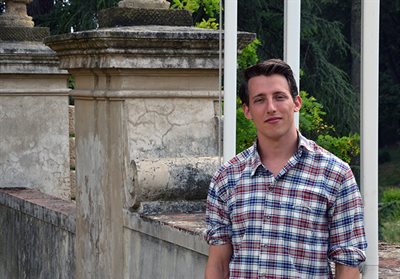Posted on 11 September 2015
 Joel Herok admits he wouldn’t mind staying longer in Florence. But after four weeks researching at the Historical Archives of the European Union in Villa Salviati he fears he might start losing focus. “There is so much material, things that I find genuinely interesting here, that I always have to remind myself to stay on point”, affirms the researcher awarded with a Sørensen Grant. Herok is a PhD candidate from the University of Göttingen (Germany) who spent the month of June at Villa Salviati researching for his thesis “The development from harmonization to “state-like” legislation in the European Communities and the European Union”. At the end of his first academic year devoted to this project, the German student regards his stay at the HAEU as a very valuable experience that broadened his horizon and gave him new ideas for his research.
Joel Herok admits he wouldn’t mind staying longer in Florence. But after four weeks researching at the Historical Archives of the European Union in Villa Salviati he fears he might start losing focus. “There is so much material, things that I find genuinely interesting here, that I always have to remind myself to stay on point”, affirms the researcher awarded with a Sørensen Grant. Herok is a PhD candidate from the University of Göttingen (Germany) who spent the month of June at Villa Salviati researching for his thesis “The development from harmonization to “state-like” legislation in the European Communities and the European Union”. At the end of his first academic year devoted to this project, the German student regards his stay at the HAEU as a very valuable experience that broadened his horizon and gave him new ideas for his research.
The question of the legal nature of the EC/EU Directive and its distinction from the Regulation has been subject to debate among scholars since the 1960s. However, the issue appears to remain unresolved until today, possibly because scholars have so far tended to neglect the historical origins of the legal instruments. The legal nature of these two instruments of EU-lawmaking is the main focus of analysis for the German student. Hence, he aims to fill this gap by adopting a historical approach. As a first step, Herok decided to focus on the negotiations of the Treaty of Rome to get an understanding of the intent of the “treaty-makers” at the time when they drafted the relevant treaty provisions. Afterwards he examined the work of the delegations on certain directives as well as the general debates regarding the law-making process in the early years of the European Economic Community. “It’s interesting to go back to the early years and see how some countries, like France, were particularly critical about certain directives”, states the researcher.
The Single European Act, the first major revision of the Treaty of Rome, became one of the main targets in the work conducted by Herok at the HAEU. “This reform included the redrafting of the most important provision on the harmonization of the laws of the Member States, so it seemed crucial to consult files on its negotiation”, says the researcher. The personal Fonds of Emanuele Gazzo allowed him to consult several documents concerning the negotiations during intergovernmental conferences. Even though the consultation of private fonds was not included in his initial research scheme, Herok remained impressed with the amount of helpful information he was able to find going through personal papers.
“Before you start collecting documents you can only guess what you are going to find, but this has made me rethink certain ideas I had at the beginning”, he states. That is also what happened when he decided to consult the papers from the European Coal and Steel Community. “I was surprised that certain matters which would influence the later development of the European Economic Community were intensely discussed at such an early stage”. This is not only true of the realization of the necessity of the elimination of distortions of competition between the Member States, which would later become the starting point for the development of provisions allowing the harmonization of laws of the Member States. Another key issue, the question of democratic legitimation and the role of the European Parliament, emerged in the debate from the beginning. “There is a direct link between the question of democratic legitimacy on the one hand and the range and intensity of supranational legislation on the other hand. After analyzing the documents concerning the founding treaties along with the Single European Act from 1986, you can see how there was a clear shift and the power to legislate was increasingly transferred from national parliaments to the European level”, points out Herok.
Joel Herok expressed his gratitude for allowing him to stay at the Historical Archives of the European Union thanks to the Sørensen Grant and confirmed that this month of research has encouraged him to keep working intensely on his PhD project that he plans to finish by the end of next year.
More about Postgraduate Sørensen Grants
Consult our database